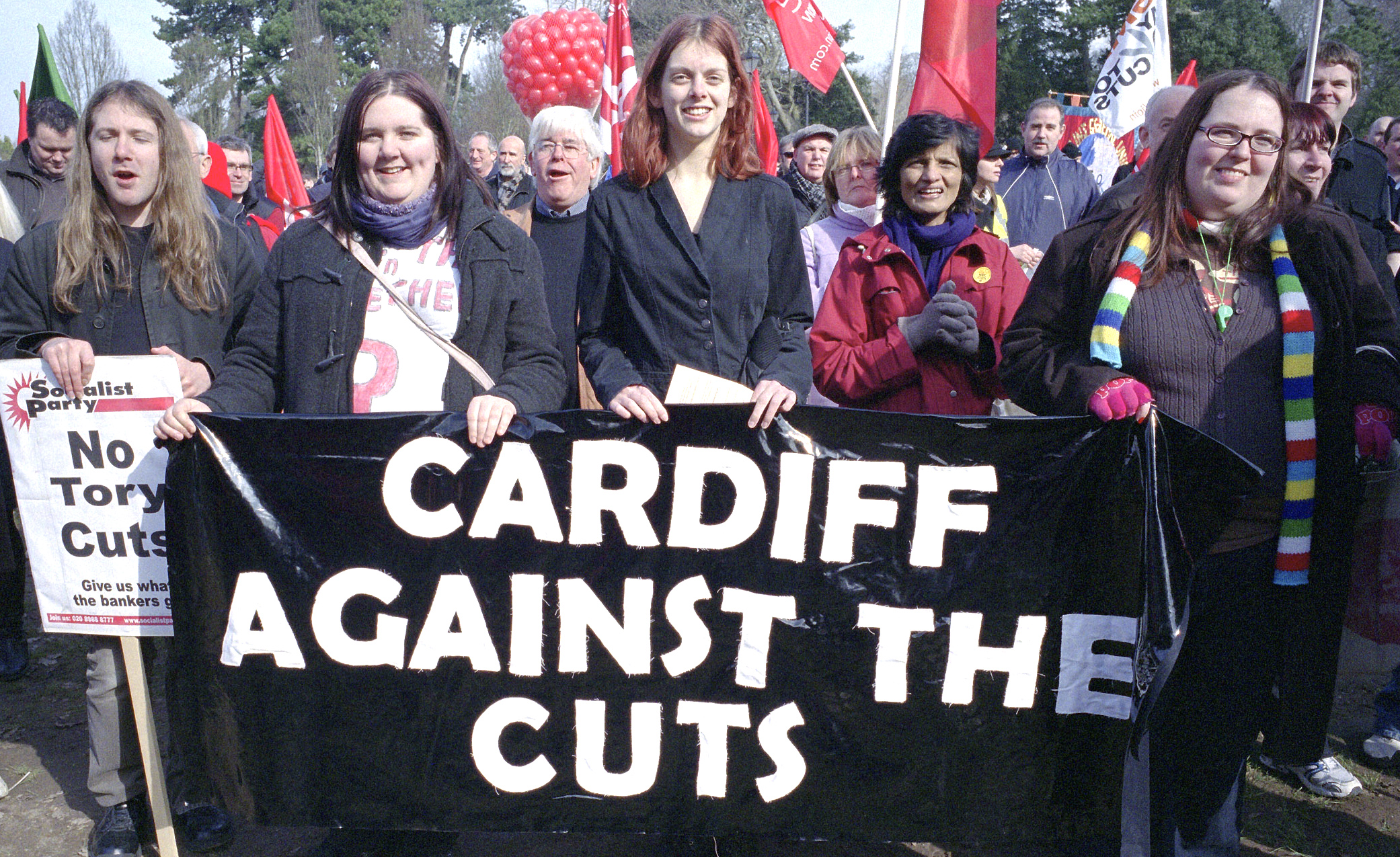To be fully effective, a workers’ party would need to put forward socialist ideas. Socialists do not accept that cuts are necessary.
Capitalism has created enormous wealth, science and technique. We have technology today that was unimaginable a generation ago.
The world economy is 17 times the size it was a century ago. Yet we are being told that the most basic public services – a decent public health service, the right to an affordable home – cannot be afforded by capitalism.
The current crisis is not caused by a bloated public sector but by the worst crisis of capitalism in 70 years. This is a crisis of the private not the public sector.
Yet all the major capitalist parties – Tories, Lib Dem and New Labour agree that it should be the working class and public services that pay for it.
Markets demand savage cuts
Any government that acts in the interests of the markets would put forward savage cuts along the lines of those being proposed by the Con-Dem coalition.
Across Europe – from the ex-social democratic governments (equivalent to New Labour) of Greece, Spain and Portugal to the right-wing capitalist parties of Britain, France, Germany and Italy; the cuts are virtually identical in their brutality.
All of Europe is dancing to the axe-men’s tune. Capitalism is in crisis and it is the working class that is expected to pay the price.
This crisis is more than simply the responsibility of a few greedy bankers. The severity of the economic crisis that began in 2008 is a consequence of the increasingly parasitic nature of capitalism over the last decades.
System based on the exploitation
Capitalism has always been a system based on the exploitation of the majority, the working class, for the profits of a few at the top.
There was a brief period, from around 1950-73, when capitalism developed rapidly. At least in the more economically developed countries, including Britain, working-class people were able to win a few crumbs from the capitalists’ table.
In Britain, a National Health Service and a mass council house building programme made a real improvement in workers’ lives.
However, when capitalism went into crisis, it set about restoring its profits by driving down the share of the wealth taken by the working class. Production was moved abroad to countries with cheaper labour, wages were driven down, and spending on public services was cut back.
Wages and benefits falling
The consequence of all of this was that, by 2007 in the G7 countries, the share taken by the working class (wages plus benefits) had fallen to a post-war low of 53% of total income.
During the last boom profits reached an all-time record. However, they had difficulty finding profitable fields to invest in.
Investment in science, technique and production remained at an historic low. Why? Because working-class people lacked the means to buy the goods that could potentially be produced.
This is the terrible reality of capitalism. It does not matter that two billion people are without the most basic necessities of life, they are not ‘a market’ because they lack the money to buy what is produced.
Instead of investing in industry, the capitalist class made its profits in the last boom by gambling on the world’s stock markets in a speculative frenzy. To try and increase their markets the working class got its own little share in the credit frenzy: cheap credit cards and mortgages – not crumbs but bubbles from the table.
Bankers’ debts nationalised

Youth Fight for jobs campaigning in Cardiff against the bankers bailouts and bonuses, photo Cardiff YFJ
But while the bankers’ debts were nationalised – handed to us to pay off via cuts in our public services – our debts (the £1.5 trillion consumer debt overhang from the boom) remain like millstones round our necks.
Socialists argue that the rich should be the ones who pay the crisis, via dramatically increased taxes for the super-rich and the big corporations. For most of the 1970s the tax rate for the highest band of income was 83%.
Likewise, for most of the 1970s, big corporations paid 52% of their profits in tax. But that percentage has been reduced step-by-step ever since, to just 28% now.
As the PCS points out, even with the existing low levels of taxation for the rich, more than £120 billion goes uncollected every year. While we favour taxing the rich, we also recognise that the ‘markets’ – neither the big corporations nor the bond traders who hold whole countries to ransom – will never meekly accept dramatically increased regulation and taxation.
Socialist solution needed
So what is the alternative to this market madness? The starting point is to refuse to accept the cuts. Faced with a determined working class, big business will be forced to retreat.
However, in its relentless pursuit of profit, capitalism would then come-back with other ways of making the working class pay, for example, by using inflation.
That is why we need a socialist solution. For a start we call for the nationalisation of the big banking and finance companies.
Compensation should be paid on the basis of proven need. Not one penny should go to the speculators who are demanding that the working class pay for the crisis for which they – the speculators – bear responsibility.
It would then be necessary to introduce full government control of all incoming and outgoing foreign trade. That would enable a democratically elected government and the working class – not the market – to control imports and exports including capital.
A socialist nationalised banking sector would be democratically run by representatives of banking workers and trade unions, the wider working class, as well as the government.
Decisions would be made to meet the needs of the majority – for example, offering cheap loans and mortgages for housing and for the planned development of industry and services, and ending all repossessions of peoples’ homes.
Just the start
However, that would only be the start. Capitalism has led to enormous economic destruction.
In Britain around 10% of wealth has already been lost as a result of the recession, due to factories and workplaces closing, resulting over 2.5 million officially unemployed with the number rising.
Nor is there any prospect of a return to healthy growth. This is the real difference between now and, for example, the end of the second world war when the total national debt was far higher than it is today – over 200% of GDP compared to around 60% now.
Then, however, Britain entered a period of significant economic growth, thereby shrinking the national debt. Today, the economy has only staggered into technical growth as a result of massive state intervention.
The cuts that are coming are most likely to push the economy into a severe ‘double-dip’ recession. The best prospect that can be hoped for under capitalism is a prolonged period of economic stagnation.
Crucial

National Shop Stewards Network protest outside Bank of England, photo Paul Mattsson
That is why a crucial step towards solving the economic crisis would be to take the big corporations that dominate Britain’s economy into democratic public ownership.
This would allow for production to be planned for need and not for profit. Even some of the representatives of capitalism have inadvertently recognised that this is the only way to solve the crisis.
Alan Greenspan, head of the US federal reserve during the boom years – once treated as a god by capitalism and how reviled as being responsible for the crisis – recently excused his role in the crisis by saying: “Unless there is a societal choice to abandon dynamic markets and leverage for some sort of central planning, I fear that preventing bubbles will in the end turn out to be unfeasible. Assuaging their aftermath seems to be the best we can hope for.”
Democratically planned economy
In the coming years, on the basis of their experience of capitalism, millions of workers will draw the same conclusion as Greenspan. ‘Central planning’ in Britain – in the sense of a democratically planned economy – would mean that building workers, for example, could be put to work building and refurbishing high quality, environmentally friendly affordable social housing for the five million people who want it.
Huge resources could be put into the development of environmentally friendly technologies. The working week could be cut, without loss of pay.
This measure, combined with an expansion of public services, could quickly eliminate unemployment. All of these, and much more, would be possible on the basis of a democratic socialist plan of production.
Of course, capitalism is an international system, and any alternative could not stop at the shores of Britain. However, if a democratically elected socialist government in any country was to begin to implement the kind of programme outlined here it would act as an enormous inspiration to workers in the rest of the world struggling against capitalism’s devastation of their living standards.
The ideas of genuine democratic socialism would spread like wildfire.










